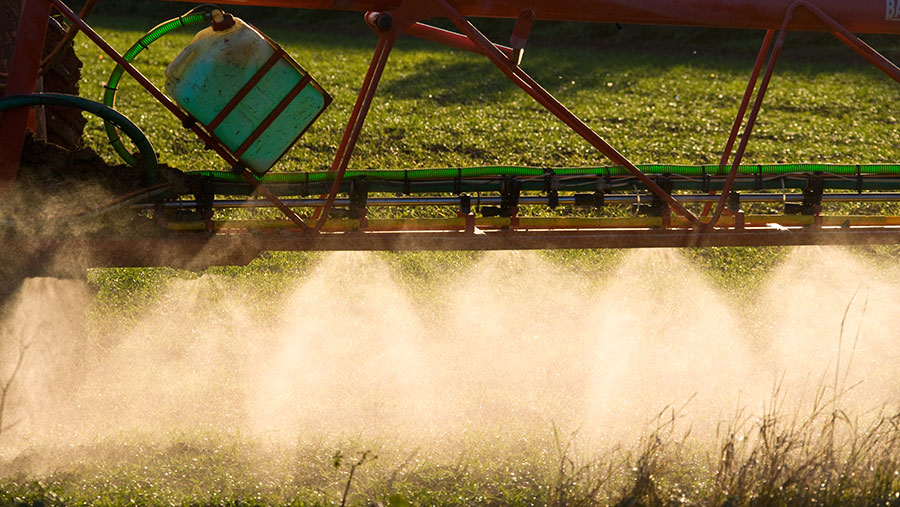MPs call for tougher action on insect decline
 © Tim Scrivener
© Tim Scrivener Stopping the ongoing decline in insect numbers in the UK is essential to improve long-term food security, a House of Commons committee has concluded.
The Science, Innovation and Technology Committee has called for “effective and sustainable crop protection strategies to be demonstrated at a commercial scale” and for more government support to encourage pesticide alternatives.
A report, Insect decline and UK food security, suggests there is a worrying trend of declining insect numbers and species diversity in the UK.
See also: EU backtracks on pesticide reductions in wake of farmer protests
The report says: “Witnesses to this inquiry have told us that within the UK, land use change, land management practices and pesticide usage are amongst the largest contributing factors to insect decline.
“Consequently, the largest influence on achieving the biodiversity targets for insect species outlined in the 2021 Environment Act, could lie in the implementation of agri-environmental policies.”
Pivotal role
It also found that insects and non-insect invertebrates both play a pivotal role in food production and suggested that, with roughly 50% of food being imported, solutions to insect decline need to be found at both UK and international level.
Committee chairman Greg Clark said: “Food security depends on maintaining and improving the biodiversity essential to ecosystems, and so does the much wider environment that we depend on for our lives, livelihoods and wellbeing.”
Mr Clark added: “Let’s see the government’s long-delayed plan for sustainable pest management, and work with the great range of passionate and committed organisations, expert and amateur, dedicated to recreating and realising the rich and biodiverse potential of the UK’s natural world.”
The UK government has committed to reducing the overall risk caused by pesticides by at least half by 2030.
Industry reaction
Josie Cohen, head of policy and campaigns at the Pesticide Action Network, said the report confirms that pesticides are one of the key drivers of insect declines.
She said: “While much attention is paid to the potential negative effects on food production caused by using fewer pesticides, actually insect declines pose a much greater, long-term existential threat to global food security.
“We urgently need to reduce the amount of pesticides we are using in the UK. As this report highlights, this isn’t just about helping farmers to grow more sustainably, it’s also about ending all the other uses of pesticides which are exposing insects to an unimaginable toxic load.
“The UK urgently needs to follow France’s lead and ban all non-agricultural pesticides, including those used in our towns and cities, gardens, and the tick and flea treatments applied to our more than 20 million pets.
“Evidence shows that many fungicides and herbicides also cause harm to insects, so we must look beyond insecticides to introduce measures which drive a reduction in the use of all pesticides and encourage the uptake of safe and sustainable alternatives.”
Monitoring
The Royal Entomological Society also welcomed the committee’s call for further research, and long-term monitoring of insect decline.
Society president Jane Hill said: “We are in agreement with the wider scientific community that there is an urgent requirement for more investment and funding to facilitate our thorough understanding of insect population trends.
“A far more cohesive and integrated approach across all government departments is required to reach vital targets, enable progress and halt population declines before it is too late.”
Natural England board member Lynn Dicks said the observed decline has very serious implications for the functioning of ecosystems, including agricultural ecosystems, crucial for sustainable food production.
She added: “These tiny animals are really important regulators of pests [because many are predatory], as well as pollinators, and they also cycle nutrients, decomposing dead matter and keeping soils fertile.”
CropLife UK also welcomed the publication of the report, after submitting its own response to the committee.
It praised the recognition given to how Plant Protection Products (PPPs) contribute to food security.
Josh Woolliscroft, head of policy and public affairs at CropLife UK, said: “A huge amount of progress has been made in recent decades and emerging technologies will help to contribute to even lower environmental risk.
“If we wish to see improved biodiversity, whilst ensuring food security, we must ensure that the high-quality agricultural spaces we have are as productive as they can be; this means ensuring growers have access to PPPs.”
Mr Woolliscroft added that it was encouraging to see that the report recognised the importance of integrated pest management in producing food and protecting the environment.
